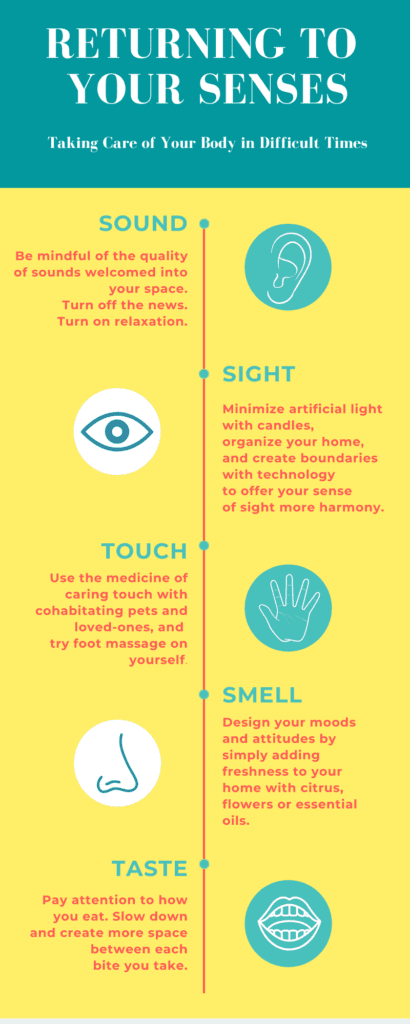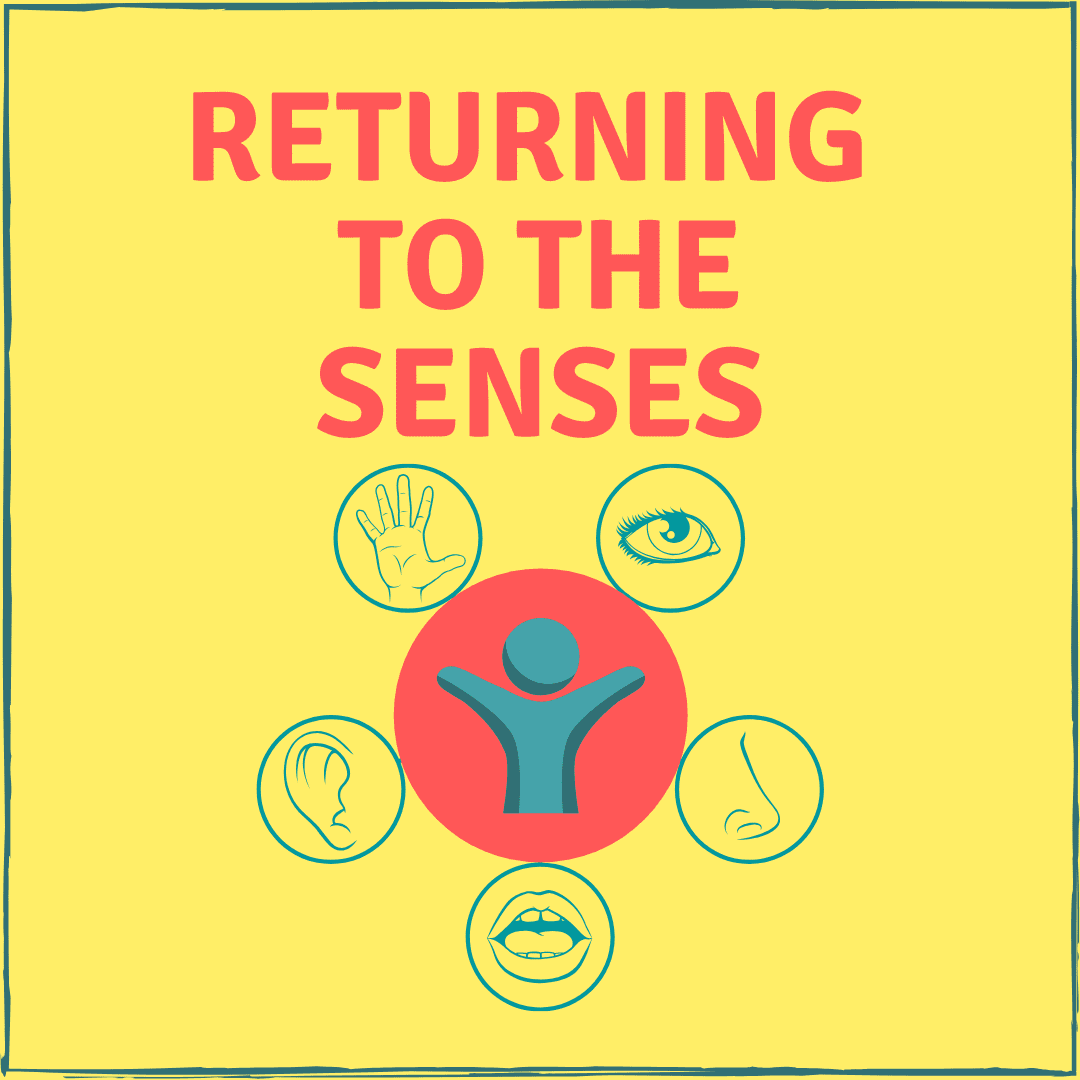It’s said that the average human being experiences anywhere between 50,000 – 80,000 thoughts per day. With so much mental stimulus filtering through our minds every hour by the thousands, it’s advantageous to our overall well-being to manage some of this excess noise. Returning to the senses, our body’s five senses, helps manage through the noise.

Observe Your Body’s Senses
With Covid-19 currently in the picture, the majority of us are spending a lot more time at home. This global event has also opened up an ongoing stream of new information that may be contributing to the overactive mind. As countless people have lost their routines, and their sense of contact with other human beings, we can leverage this as an opportunity to begin observing our own relationship with our senses.
The simplest and most effective way to manage the overactive thinking mind is by returning to the senses. We all know of the five senses – there is sight, hearing, smell, taste, and touch.
When we are stuck in the mind, it is often an indication that we are disconnected from what’s happening in the body. It’s in these moments that it’s useful to remember that the clearest path out of the mind is back into the body.
This matters because the state of our health is deeply rooted in how we are engaging with our senses. Overthinking is affiliated with numerous physical and psychological symptoms, and conditions. From headaches, depression, anxiety, stomach issues, and more, there is a direct link between the activities of the mind and those of the body.
This all being said, the environments we spend the most time in contribute to how we feel. While the majority of people today are staying home, it’s a good opportunity to start taking inventory of our sensory experiences.

SOUND
Start by considering what kind of sounds you welcome into your space. What ambient sounds are most often lingering in the background? Is the television broadcasting news for most of the day? Can you hear any sounds of nature? The sounds that we allow to project in and around our bodies and homes are not benign. They have impact and ultimately give us energy, or take energy from us. The practice here is to be mindful of the quality of sounds we welcome into our space.
SIGHT
Another practice to evoke the senses is by noticing what is directly in sight. Often much of our lingering anxiety and over stimulation is due to excess screen time, use of bright lights at night, and simply being surrounded around too much stuff. Micro-actions such as minimizing artificial light with candles, organizing our homes, and creating boundaries with technology offers our sense of sight more harmony.
TOUCH
Human contact and our touch sense is also essential to our well-being. This is because our body’s chemistry receives bountiful reward through these kinds of interactions. While physical touch in the days of COVID-19 have shifted momentarily, we still have access to the medicine of touch with loved ones we are cohabitating with, with pets, and of course with ourselves. The skin is our largest organ system in the body, and simple acts of kindness towards it supports optimal function. If you don’t know where to start try massaging your favorite oil to the bottoms of your feet every night for 3 nights, and see if you notice a difference. The feet are gateways to all of our body systems, and a simple massage like this will relax the nervous system.
SMELL
Our sense of smell is also an effective way to influence how we feel on a moment to moment basis. This is because the chemistry of our brain literally changes with the information received from the aroma. Keeping this in mind, consider how you feel when you enter a room and smell fresh citrus, versus the smell of stale dust. We can design our moods and our attitudes with something as simple as adding freshness to the home.
TASTE
Lastly, we have our sense of taste. Although we have to eat for nourishment, we often forget that eating can be a vivid experience that connects us to our aliveness. In times of stress or anxiousness, many also have a tendency to turn to food for comfort – it’s in this way that food is a very emotional telltale subject. This being said, paying attention to how we eat is just as important to our health as what we eat. While many of us are accustomed to tuning out from the food in front of us, we can use eating as an opportunity to further explore with the senses. To do this, we must first slow down and create more space between each bite. Only then will we begin to better listen to the body’s messages.
Now that we’ve traveled through our five senses, we invite you to put some of these considerations into practice. In a world where we exist so predominantly in our minds, let us return to the body by returning to the senses.
We are all being called to do extraordinary things for the collective caring of our families, communities and the world in response to the unique coronavirus pandemic. Whether home bound or providing critical services, everyone is stretched to adapt like never before. All of us are in this together. Now more than ever, caring is what we need most. Caring for our self. Caring for others around us. Life is going to require new routines, resilience and compassion. We invite you to join us in creating a caring movement to respond to local needs.
Would you like to read more about UCA caring resources and products? We have other blogs on Unified Caring Association and our products, caring in our communities, and caring the UCA way!
By Melissa Aparicio, contributing author


